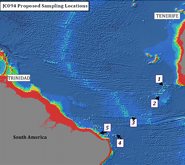A team of ocean scientists have set sail on a first-of-its-kind expedition across the Equatorial Atlantic to collect coral samples at depths of 4,000 metres to help understand the environmental controls on largely unexplored deep-sea ecosystems.
The European Research Council-funded project, led by Dr Laura Robinson from Bristol’s School of Earth Sciences, comprises paleoceanographers, chemists, geologists and biologists, who will be collecting sediment cores, seawater and fossilised deep sea corals, making at least five major stops on seamounts and the mid-Atlantic Ridge.
Using the remotely-operated vehicle, ISIS, which can dive to the sea floor reaching depths of 4,000 metres, the team will collect valuable video and coral samples that act as a window on the climate of the past and help researchers understand the environmental controls on largely unexplored deep-sea ecosystems.
Dr Robinson said: “This project is a focused study of present and past ocean chemistry in the Equatorial Atlantic designed to address how the oceans modulate climate, as well as assess the impact of ocean chemistry on fragile deep-sea ecosystems.
“Despite decades of research there are distinct gaps in our knowledge of the history of the deep and intermediate ocean. To date, there have been no studies that attempt to match up co-located deep-sea coral, seawater and sediment samples in a single programme, so this would be the first directed study of its type, and as such promises to provide a substantial step in quantifying the fluxes and transport of mass, heat and nutrients across the equator in the past.
“Major hurdles include access to suitable archives, development of geochemical proxies and analyses that are sufficiently precise to test climate hypotheses. Through a combination of field work, modern calibrations and cutting-edge geochemical analyses this project will produce samples and data that address each of these gaps.”
The trip runs from Sunday 13 October until Saturday 30 November 2013. For more information visit the Tropics project website, Facebook, Twitter, Youtube, Flickr.
